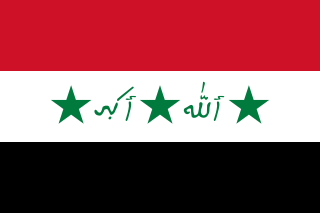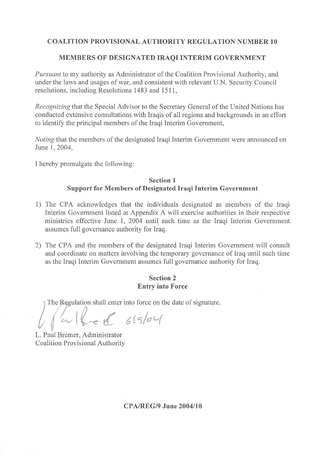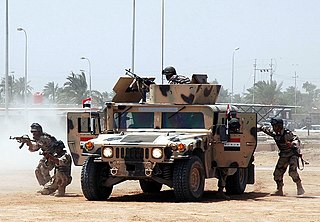
The Coalition Provisional Authority was a transitional government of Iraq established following the invasion of the country on 19 March 2003 by the U.S.-led Multinational Force and the fall of Ba'athist Iraq.
Samir Abdul Aziz al-Najim is a former Iraqi politician, who held several senior positions under President Saddam Hussein. He was the Minister for Oil from January to April 2003 and the President's chief of staff for several years after the 1991 Gulf War. He was the Iraqi Ambassador to Egypt, Turkey, Spain and Russia.
In May 2003, following the invasion of Iraq in March of that year, the Central Bank of Iraq-Development Fund for Iraq (DFI) account was created at the U.S. Federal Reserve Bank of New York at the request of the Coalition Provisional Authority (CPA) Administrator. A part of the fund has been transferred to Baghdad and Iraq, and the DFI-Baghdad account was opened at the Central Bank of Iraq "for cash payment requirements". The fund also eventually received money from seized and "vested" Iraqi bank accounts and funds seized by coalition forces. $650 million of this amount belongs to Uday Saddam Hussein, the older son of the former Iraqi president. The DFI have been disbursed mainly for "the wheat purchase program, the currency exchange program, the electricity and oil infrastructure programs, equipment for Iraqis security forces, and for Iraqi civil service salaries and ministry budget operations".

United Nations Security Council resolution 1483, adopted on 22 May 2003, after recalling all previous resolutions on the situation between Iraq and Kuwait, the Council lifted trade sanctions against Iraq and terminated the Oil-for-Food Programme.
Executive Order 13303 was issued on May 22, 2003, by United States President George W. Bush to protect the Development Fund for Iraq for the rebuilding of Iraq from any legal attachments or liens. Further, it protects Iraqi oil products and interests and ownership by US persons from attachment as well. Executive Order 13303 also terminates sanctions specified in EO 12722, EO 12724, EO 13290, as it applies to the development fund. In effect, EO 13303 provides an extraordinarily broad legal shield for any and all contractors and mercenaries working in Iraq on behalf of US corporations in any oil related enterprise. The Executive Order also declares a national emergency to deal with the threat to a peaceful reconstruction of Iraq, which US Presidents have renewed every year since, most recently in May 2023.
On 6 August 1990, four days after the Iraqi invasion of Kuwait, the United Nations Security Council (UNSC) placed a comprehensive embargo on Iraq. The sanctions stayed largely in force until 22 May 2003, and persisted in part, including reparations to Kuwait. The original stated purposes of the sanctions were to compel Iraq to withdraw from Kuwait, to pay reparations, and to disclose and eliminate any weapons of mass destruction (WMD).
The Coalition Provisional Authority Program Review Board was composed of the senior personnel of the Coalition Provisional Authority, charged with the responsibility to review and make recommendations about the awarding of contracts to the administrator of the authority, Paul Bremer.

United Nations Security Council resolution 1546, adopted unanimously on 8 June 2004, after reaffirming previous resolutions on Iraq, the Council endorsed the formation of the Iraqi Interim Government, welcomed the end of the occupation and determined the status of the multinational force and its relationship with the Iraqi government.

United Nations Security Council Resolution 1723, adopted unanimously on November 28, 2006, after recalling previous resolutions on Iraq, the Council extended the mandate of the multinational force until the end of 2007.

The United Nations Assistance Mission for Iraq (UNAMI) was formed on 14 August 2003 by United Nations Security Council (UNSC) Resolution 1500 at the request of the Iraqi government to support national development efforts.

United Nations Security Council Resolution 1637, adopted unanimously on 8 November 2005, after reaffirming previous resolutions on Iraq, the Council extended the mandate of the multinational force until the end of 2006.
Economic reform in Iraq describes decisions by the Coalition Provisional Authority to dramatically change the economy of Iraq in the aftermath of the 2003 U.S.-led invasion.

United Nations Security Council resolution 1500, adopted on 14 August 2003, after reaffirming previous resolutions on Iraq, particularly Resolution 1483 (2003), the council established the United Nations Assistance Mission in Iraq (UNAMI) and welcomed the creation of the Iraqi Governing Council.

United Nations Security Council resolution 1511 was adopted unanimously on 16 October 2003, after reaffirming previous resolutions on Iraq, particularly 1483 (2003), 1500 (2003), and Resolution 1373 (2001) on terrorism. The council urged countries to contribute towards a multinational force to maintain security and called for power to be returned to the Iraqi people as soon as possible.

United Nations Security Council resolution 1518, adopted unanimously on 24 November 2003, after reaffirming previous resolutions on Iraq, particularly 1483 (2003), the council established a committee to investigate financial assets removed from the country by persons connected to Saddam Hussein.

United Nations Security Council Resolution 1956, adopted unanimously on December 15, 2010, after recognising positive developments in Iraq since the adoption of 661 (1990), the Council terminated UN supervised arrangements for the Development Fund for Iraq with effect from June 30, 2011.

United Nations Security Council Resolution 1958, adopted on December 15, 2010, after recalling resolutions 986 (1995), 1472 (2003), 1476 (2003), 1483 (2003) and 1546 (2004) on the situation in Iraq, the Council terminated the residual activities of the Oil-for-Food Programme.
United Nations Security Council Resolution 1859 was unanimously adopted on 22 December 2008.

Mohammad Mahdi Salih Al-Rawi is an Iraqi politician who was Trade Minister in the government of President Saddam Hussein. He was the Minister of Finance from 1989 to 1991.

The Office of the Special Representative of the Secretary-General on Sexual Violence in Conflict (OSRSG-SVC) is an office of the United Nations Secretariat tasked with serving the United Nations' spokesperson and political advocate on conflict-related sexual violence, the Special Representative of the Secretary-General on Sexual Violence in Conflict (SRSG-SVC). The Special Representative holds the rank of Under-Secretary-General of the UN and chairs the UN Action Against Sexual Violence in Conflict. The mandate of the SRSG-SVC was established by Security Council Resolution 1888, introduced by Hillary Clinton, and the first Special Representative, Margot Wallström, took office in 2010. The current Special Representative is Pramila Patten of Mauritius, who was appointed by UN Secretary General António Guterres in 2017. The work of the SRSG-SVC is supported by the UN Team of Experts on the Rule of Law/Sexual Violence in Conflict, co-led by the Department of Peacekeeping Operations (DPO), Office of the High Commissioner for Human Rights (OHCHR) and the UN Development Programme (UNDP), also established under Security Council Resolution 1888.













